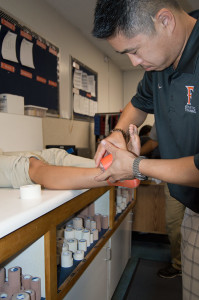
It’s not a secret that athletics at Cal State Fullerton are deeply rooted in Titan culture, but there’s a whole roster of off-the-field talent that devotes its days to keeping injured athletes on track to a healthy recovery.
CSUF is extremely proactive when it comes to assisting injured athletes with a team of faculty and staff to support their Titans, Director of Sports Medicine Julie Max said.
With eight athletic trainers beside her, Julie and her team coordinate an all-inclusive recovery program for student athletes.
“We are there to help prevent injuries, we’re there to diagnose injuries and we’re there to treat injuries, so this particular clinic is potentially open seven days a week … it is designed for exactly that purpose. It is to care for the health and safety of our student athletes,” Max said.
With 15 teams and nearly 400 athletes at CSUF, there are plenty of people to tend to through the seasons.
Max and her team of certified athletic trainers treat everything as small as blisters and abrasions to major concussions and appendicitis. They even cope with any psychological or sociological problems that athletes might have.
“Anything that does not allow the athlete to compete (at) 100% comes into this clinic,” Max said.
The team of athletic trainers at CSUF is constantly utilizing their health center resources to diagnose injuries and provide for athletes’ needs.
“We see (athletes) first, we assess them, we make a diagnosis and if we need to move on and get further health care assistance, then that’s what we do,” Max said. “Everything starts here and then we triage to figure out, ‘What do we need to be in the best interest of the student athlete?’”
Last fall, women’s soccer player Ali White geared up for Big West Conference play, but a season-ending injury forced her to hang up her cleats. She received firsthand experience with the team of athletic trainers.
After tearing her ACL and meniscus, White’s trainer immediately scheduled her for doctor appointments, including one with CSUF’s orthopedic surgeon, Miguel Prietto, who started White on physical therapy right away.
“They were just very involved … it was cool,” White said.
But dealing with an injury brings on more than just physical strain for players.
“You definitely tell yourself … ’was this meant to happen? Am I not supposed to play soccer anymore?’ … You just beat yourself down,” said White.
In her kinesiology class, Max poses the question, “How do we deal with the psychological and sociological effect of student athletes that get hurt?”
“Physically I know what to do with them. I know how to take care of them, I know how to treat them, I know how to rehab them,” explained Max.
Providing a service to psychologically help students get through the injury phase is another element that they incorporate.
With this being her first major injury since she began playing soccer at 5 years old, White experienced mental strain firsthand following her accident last fall.
“I feel like I became kind of disconnected,” White said.
With the team practicing five days a week and White away at physical therapy, the mental aspect of recovery began to set in.
With the encouragement of her physical therapists and fellow players, White quickly realized that the soccer field is where she is meant to be, and she will be returning this season as a junior.
“I’m so excited. I’m really pumped,” White said. “I’m just going to go out there — I’m really proud of myself — I’m gonna be out there accomplishing something that wasn’t possible five months ago.”
ORIGINAL ARTICLE:
Titan athletes have a plethora of resources to recover from injuries